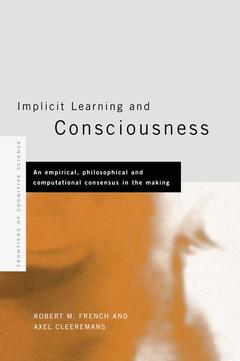Implicit Learning and Consciousness An Empirical, Philosophical and Computational Consensus in the Making Frontiers of Cognitive Science Series
Coordonnateurs : Cleeremans Axel, French Robert

Can you learn without knowing it? This controversial and much debated question forms the basis of this collection of essays as the authors discuss whether the measurable changes in behaviour that result from learning can ever remain entirely unconscious. Three issues central to the topic of implicit learning are raised. Firstly, the extent to which learning can be unconscious, and therefore implicit, is considered. Secondly, theories are developed regarding the nature of knowledge acquired in implicit learning situations. Finally, the idea that there are two separable independent processing systems in the brain, for implicit and explicit learning, is considered.
Implicit Learning and Consciousness challenges conventional wisdom and presents the most up-to-date studies to define, quantify and test the predictions of the main models of implicit learning. The chapters include a variety of research from computer modelling, experimental psychology and neural imaging to the clinical data resulting from work with amnesics. The result is a topical book that provides an overview of the debate on implicit learning, and the various philosophical, psychological and neurological frameworks in which it can be placed. It will be of interest to undergraduates, postgraduates and the philosophical, psychological and modeling research community.
List of Contributors. List of Figures and Tables. Foreword. Introduction. A. Cleeremans, L. Jimenez,Implicit Learning and Consciousness: A Graded, Dynamic Perspective. Introduction. Adaptation, Adaptive Changes, and Learning. Consciousness. The Function of Consciousness: Commander Data meets the Zombies. The Framework. Implications. Discussion: What We Leave Behind. Acknowledgements. References. P. Perruchet, A. Vinter,The Self-organising Consciousness: A Framework for Implicit Learning. Attention is a Condition for Learning. From Attentional Resources to Phenomenal Consciousness. The Self-organisation of Perceptual Experience in Word Discovery. Generalisation. Rethinking Implicit Learning. Abstracting away from the Sensory Content. Consciousness: From 'Necessity' to 'Sufficiency'. Acknowledgements. References. Appendix: PARSER. Z. Dienes, J. Perner,A Theory of the Implicit Nature of Implicit Learning. What is a Representation? Implicit versus Explicit Representation. Implicit and Explicit Knowledge. Consciousness. Procedural versus Declarative. Voluntary Control. Implicit/Explicit and Meta-cognition. Implicit Learning. Summary. References. D.R. Shanks, T. Johnstone, A. Kinder,Modularity and Artificial Grammar Learning. Forms of Knowledge. Evidence for the Episodic-processing Account. Problems with Finite-state Grammars. The Biconditional Grammar. Artificial Grammar Learning in Amnesia. Conclusions. Acknowledgements. References. M. Redington, N. Chater,Knowledge Representation and Transfer in Artificial Grammar Learning (AGL). Introduction. What is Transfer? Why is Transfer Important? What Does Transfer Really Show? Knowledge Representation in AGL. Surface-independent and Surface-based Representations. Empirical Evidence. Evidence for the Acquisition of Surface-independent Knowledge. Discussion. Acknowledgements. References. T. Meulemans, M. van der Linden,Artificial Grammar Learning in Amnesia. The Amnesic Syndrome. Implicit Learning in Amnesic Patients: A Review. Conclusion. References. Author Index. Subject Index.
Robert M. French and Axel Cleeremans are both experts in cognitive science , from the University of Liege and the Universite Libre de Bruxelles, respectively.
Date de parution : 06-2015
15.6x23.4 cm
Disponible chez l'éditeur (délai d'approvisionnement : 14 jours).
Prix indicatif 61,25 €
Ajouter au panierDate de parution : 04-2002
Ouvrage de 174 p.
15.6x23.4 cm
Thème d’Implicit Learning and Consciousness :
Mots-clés :
artificial; grammar; finite; state; amnesic; patients; grammaticality; judgements; test; items; Artificial Grammar Learning; Chunk Strength; Artificial Grammar Learning Paradigm; AGL Study; AGL Experiment; Implicit Learning; Finite State Grammars; Grammatical Test Items; Amnesic Patients; Training Items; SRT Task; Higher Order Thought Theory; Training Strings; Korsakoff Patients; Implicit Learning Tasks; Artificial Grammar Learning Task; Classify Test Items; Inverse Condition; Implicit Learning Abilities; Artificial Grammar; SOC; Learning Items; Experiment 2a; Study Phase; Fully Explicit



